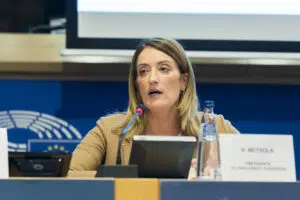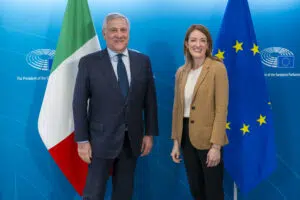Brussels – The President of the European Parliament, Roberta Metsola, raises the level of attention on the risks that the 27 EU member states will face at the polls in June while assuring that “we are not afraid, we know how to work together to stop them.” Against disinformation, foreign interference, and extremists, the European Parliament President indicates the priorities when there are just over 60 days before the June 6-9 election for the renewal of members of the EU Parliament: “If we have to correct something, let’s do it, but by building instead of destroying,” because the Union “is not perfect, but it is the best guarantee for all our citizens.”

Speaking at the ‘The Europe to Come’ event organized today (April 3) by Ansa at the Brussels headquarters of the EU Parliament, Metsola focused on the fact that “we know what is at stake” in the June elections “and so do those players who will, I don’t know to what extent, try to disrupt our democratic process.” The implicit reference regarding foreign interference – “we have alerted before, and we have seen them come back in the last few days” – is to ‘Moscowgate,’ the new scandal that could hit the European Parliament and that could lead to the revelation of a network of undue Kremlin influence among some MEPs to promote its propaganda.
Among the main concerns of President Metsola is that “in many places, there is a generation of people who, despite having all the information in the world at their fingertips, are more skeptical than before.” Driven by disinformation, “there are political forces that only want to destroy” and on which the vote of first-time voters could partly converge: “We have to explain to them that those extremists when we vote on Erasmus, research, housing, and employment, will vote against,” the EU Parliament head strongly emphasized. That is why in an election campaign that is “more aggressive and hostile than ever,” it will be necessary to provide reassurances to the most skeptical voters that “we will be the pro-European majority that will work for them, but we cannot ignore them, nor think that the threat will disappear on its own.” Even by being self-critical when necessary, as in the case of the Green Deal: “In our grand ambition of combating climate change, we have to be careful not to go too far, too fast,” because “there is a fine line beyond which we cannot push people” to be able to afford, even economically, the clean transition: “We have to be honest with ourselves about where we could have done better.”

From left: Italian Foreign Minister, Antonio Tajani, and European Parliament President, Roberta Metsola (April 3, 2024)
Italian Foreign Minister and former President of the European Parliament (between 2017 and 2019), Antonio Tajani, reiterated Metsola’s words on fighting disinformation and extremists, speaking at the event before attending the NATO ministerial meeting.” The battle against fake news is a battle of freedom, and the Parliament has always been a garrison and a bulwark, including during European elections.” While “everyone has to choose according to his or her own opinion,” it is also true that this opinion “cannot be forced by things that are not true,” but also that “those who do not go to vote are always wrong. One cannot complain about Europe if one does not vote.” That is why “we need more participation than in the last European elections” – when the average EU-wide rate stood at 50.66 percent of those eligible to vote – otherwise, “we risk having a perception of the European Union as a bureaucratic machine,” Tajani warned. Regarding the push for “more Europe from a political point of view,” the Italian foreign minister calls for “a Parliament that counts more and more with the power of legislative initiative” and says he is also “in favor of a single President of the European Commission and Council, elected by the citizens.”
English version by the Translation Service of Withub






![Un campo coltivato [foto: imagoeconomica]](https://www.eunews.it/wp-content/uploads/2025/04/campo-coltivato-120x86.png)